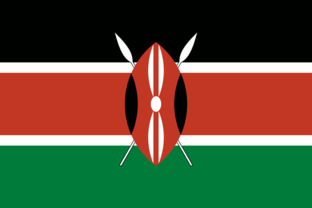Muthoni Kirima
Muthoni wa Kirima (born 1931[1]) is a retired top-ranking female fighter in the Kenya Land and Freedom Army of the Mau Mau Uprising in the 1950s. Few Mau Mau women became active fighters, and Muthoni is the only woman to have attained the Mau Mau rank of field-marshal.[2][3]

Early life
Muthoni wa Kirima was born in 1931 to parents working on a European farm in Kenya's central region. Her journey as a revolutionary started when she was a girl, saving money to fund Jomo Kenyatta's travels abroad. After her marriage to General Mutungi, she moved to a village reserve for Africans in Nyeri before joining the Mau Mau.
In the Mau Mau uprising
In her 20s, she worked as a spy for Mau Mau fighters who had camped in the forest when war broke out in 1952.[4]
During the war, Muthoni was wounded on two occasions. On one, she and seven other fighters were attacked. She was able to crawl to safety with a gunshot wound in her shoulder, but all the others were killed. Muthoni was never caught in the forest.
She moved out of the forest after Kenya gained independence from Britain in 1963. Her husband, General Mutungi, died two years later.[3]
Trading in ivory
Field Marshal Muthoni got a license to trade in ivory in 1966,[3] recovering and selling tusks the Mau Maus had buried around Mount Kenya, having hunted elephants for food and ivory during the uprising. Her permission to collect and sell "wild" ivory ended in 1976 when trade in ivory was banned.[5]
Later life
In 1990, she served as a nominated councilor in Nyeri County Council, central Kenya.[6]
In 1998, President Daniel arap Moi awarded her a medal for distinguished service, and in 2014, President Uhuru Kenyatta awarded her the Head of State Commendation.[7]
Currently, Muthoni wa Kirima lives in a Nyeri suburb.[3] "Kenya is my only child," she told the Daily Nation in an interview in 2012, referencing a miscarriage[8] during her time in the forest which left her unable to conceive.[8] As of 2013, she still has the long dreads that she had grown while hiding from the British. She has said that she will not cut her hair until she sees the benefit of independence.[9]
References
- https://books.google.com/books?id=pD63DwAAQBAJ&pg=PT100&dq=Muthoni+Kirima+1931&hl=tr&sa=X&ved=0ahUKEwjb_L6UzKHnAhWBLewKHVVeA3wQ6AEIMDAA#v=onepage&q=Muthoni%20Kirima%201931&f=false
- K24TV (2014-06-01), Muthoni Kirima, The Only Female Mau Mau Field Marshal, retrieved 2016-12-08
- "Bitter, betrayed but buoyant". Daily Nation. Retrieved 2016-12-08.
- Mwangi, James. "We survived on bamboo shoots, stolen salt during freedom struggle — Field Marshal Muthoni". Standard Digital News. Retrieved 2016-12-08.
- "Field Marshal who snubbed Mzee". Daily Nation. Retrieved 2016-12-08.
- Mcgoye Marjorie, Naomi L. Shitemi (1993). Warrior Woman. New York University: New York University. p. 316 – via Open Edition.
- Mwangi, James. "Kenya is messed up, it is as if we don't know God- Freedom fighter Field Marshal Muthoni wa Kirima". Standard Digital News. Retrieved 2016-12-08.
- Howden, Daniel. "Muthoni, the dread of the empire". The M&G Online. Retrieved 2016-12-08.
- "Historic hair". The Economist. 2013-04-06. ISSN 0013-0613. Retrieved 2016-12-19.